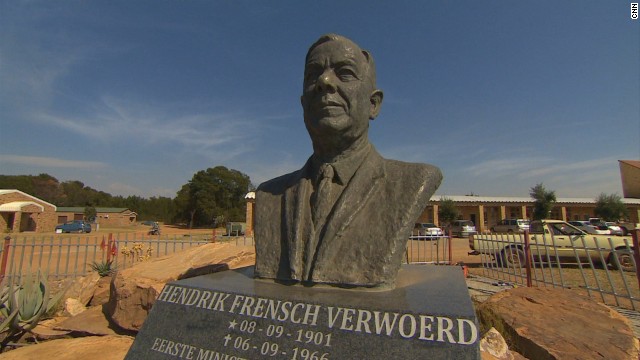South African town accused of keeping apartheid alive
May 31, 2013 -- Updated 1043 GMT (1843 HKT)
STORY HIGHLIGHTS
- The South African community of Kleinfontein is accused of keeping apartheid's ideals alive
- Apartheid was a policy of systematic racial discrimination
- A Kleinfontein spokeswoman says it is a "cultural community" for Afrikaaners only
- Its residents are accused of using culture and heritage to discriminate against black people
White men clad in
military uniforms stamped with an old South African flag guard the gates
of the controversial settlement known as Kleinfontein.
All the signs within its
boundaries are written in Afrikaans, the language that developed out of
the Dutch dialect spoken by early colonizers and which is spoken by the
town's 1,000 white inhabitants.
A bust of Hendrick Verwoerd, the assassinated prime minister considered the architect of apartheid, greets visitors upon entry.
"Kleinfontein is a
cultural community," explains its spokeswoman Marisa Haasbroek, "if you
are not an Afrikaaner you cannot live here." Afrikaaners are white South
Africans of mostly Dutch descent. The private settlement has made
headlines in recent weeks after it was exposed by a local newspaper.
Haasbroek defends its existence saying residents simply want to live
among their own kind.
The 50-year-old mother of
two tells CNN she moved to Kleinfontein six years ago shortly after her
car was stolen in the city center.
"I was just sick of
crime," she says. "My parents-in-law were already living here and they
told us Kleinfontein is safe," Haasbroek, her engineer husband and their
children packed their belongings and moved to the "whites only"
enclave.
The area has been in
existence since the 1990s. It was formed on the eve of democratic
elections at around the same time as its better-known sister settlement,
Orania, in the Northern Cape. Most South Africans knew Orania but have
only recently learned about Kleinfontein.
Its residents are accused of using culture and heritage to discriminate against black people.
There were even reports that the community has once refused to be assisted by black police officers.
"That's simply not true," Haasbroek says. "We do not discriminate, we differentiate."
South Africa's official
opposition recently held a protest at Kleinfontein vowing to "liberate"
residents from their "apartheid mindsets."
The mayor of Tshwane --
the municipality Kleinfontein falls under -- has also conducted a site
visit, saying he supported the residents' right to "conserve their
heritage but that it must be balanced with the freedom of others to
reside anywhere in the republic."
Despite differing
opinions on the matter their right to self-determination is protected by
the constitution and the government has said they have the right to
live this way.
Race is still an
emotional topic in South Africa and Haasbroek has been at pains to
explain that residents are screened based on culture, language,
religion, history - but not race.
"We are trying to
preserve our own identity," Haasbroek says. "We are swamped by people
who are not like us. We are a minority like the people of Tibet in China
and like the Palestinians. But we don't want our own state. We respect
the laws of South African and we want to remain here."
Orania and Kleinfontein
represent about 2,000 people, a tiny minority of the overall Afrikaaner
community in South Africa. Haasbroek says crime and affirmative action
have left them feeling left out of the so-called "Rainbow Nation."
"We don't really feel welcomed in the new South Africa so we are saying, just give us a little bit of independence."
They already run their
own school and they build their own infrastructure. They want to be
recognized as a self-contained municipality -- something the local
government has said will not happen.
http://edition.cnn.com/2013/05/31/world/africa/south-africa-kleinfontein-apartheid-nkepile-mabuse

No comments:
Post a Comment